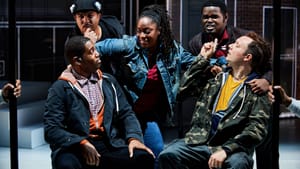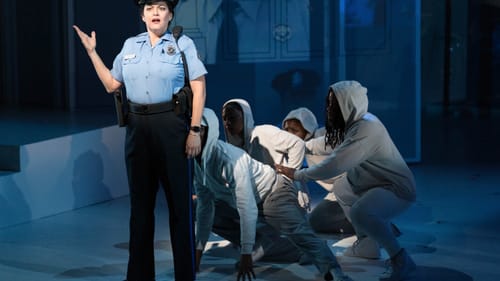Stay in the Loop
BSR publishes on a weekly schedule, with an email newsletter every Wednesday and Thursday morning. There’s no paywall, and subscribing is always free.
The ghosts keep calling
Opera Philadelphia's O17 Festival world premiere 'We Shall Not Be Moved'

“What does opera have to offer me?” To this question, I can answer We Shall Not Be Moved, a haunting piece of music theater receiving its world premiere as part of Opera Philadelphia’s O17 Festival. This brief but substantial work — created by Daniel Bernard Roumain (score) and Marc Bamuthi Joseph (libretto), and directed by the great Bill T. Jones — reminds its audience that the painful aftershocks of tragic events are felt for generations.
I often get that question about opera from friends in my peer group who know of my love for the art form. To them, opera is horned helmets and ear-shattering high Cs; it’s four hours in uncomfortable clothes, sitting next to snobby one-percenters.
I’m always quick to reference the tradition of political engagement that defined the genre since its beginnings. After all, Giuseppe Verdi’s works practically forged Italian identity as we know it. And just three years ago in this country, protestors swarmed Lincoln Center to register displeasure over The Death of Klinghoffer, an opera that dramatizes the real-life murder of a disabled Jewish man by Palestinian terrorists.
A Philadelphia story
Philadelphians young and old don’t need to be reminded about the particulars of the 1985 MOVE bombing, which killed 11 people and leveled nearly an entire West Philly neighborhood. It’s an event that still permeates life in this city. We Shall Not Be Moved doesn't dramatize the incident; rather, it uses historical context to start a conversation about race relations, poverty, and opportunity.
An act of violence sets the opera’s complex plot in motion. Five teenagers who identify as black (although one is sung by a performer who appears to be white) take refuge in an abandoned home built on the Osage Avenue site of the MOVE bombing. They call themselves a family and eschew school. They will learn instead from the ghosts, called OGs (Original Ghosts), who haunt the property, dropping notes from the ceiling that speak directly to the group’s lived experience. “That’s my teachers talkin’,” Un/Sung (Lauren Whitehead) tells us. “This is the place where I am moved. It is a part of the history I choose.”

Joseph’s intelligent libretto blends traditional aria, spoken-word performance, poetry, and rap into a seamless garment of storytelling. Roumain occasionally infuses his writing with elements alien to traditional operatic orchestration, as when a thumping bass line converses with strings in the work’s opening moments. (The onstage orchestra is brilliantly conducted by Viswa Subarraman.) But minimalism quickly emerges as the work’s overarching style; many of the opera’s most arresting passages recall the work of composer John Adams. Roumain’s musical choices always complement the piece's text-forward nature.
"Nothing is ornamental"
A dance writer could better articulate the brilliance of Jones’s choreography from a technical standpoint. Theatrically speaking, his movement choices reflect the reality of history as something that cannot be escaped. Jones often has the OGs writhe and contort while the main characters sing, speak, and try to make sense of their place in the world. This is always heightening, never distracting. Nothing is ornamental here.
Opera Philadelphia has assembled an extraordinarily good cast for this world premiere. Standouts include Whitehead, a spoken-word artist serving as the evening’s unreliable narrator; the rich-voiced Kirsten Chavez as a Latinx West Philly cop, a “brown girl” who “bleeds blue”; and especially countertenor John Holiday, whose velvety mezzo timbre adds an ethereal element to his character, a trans boy who implores God to “heal my body.”
I’m still not convinced the opera, which runs slightly more than two hours, needs an intermission. The forced break merely saps the momentum built by the show’s arresting first act. I haven’t figured out why the production employs amplification. Robert Kaplowitz’s subtle sound design never feels intrusive, but it’s entirely unnecessary in a space as intimate as the Wilma. And although New York and London engagements are already on the books, it remains to be seen what kind of impact this work will have with audiences who lack an intimate connection to its history.
What cannot be denied is that We Shall Not Be Moved is a smart and deeply affecting work that puts Philadelphia’s past in dialogue with its present. It shows that opera still has much to teach us about our world.
What, When, Where
We Shall Not Be Moved. By Daniel Bernard Roumain and Marc Bamuthi Joseph, Viswa Subbaraman conducted, Bill T. Jones directed. Opera Philadelphia. Through September 24, 2017, at the Wilma Theater, 265 S. Broad Street, Philadelphia. (215) 732-8400 or operaphila.org.
Sign up for our newsletter
All of the week's new articles, all in one place. Sign up for the free weekly BSR newsletters, and don't miss a conversation.

 Cameron Kelsall
Cameron Kelsall